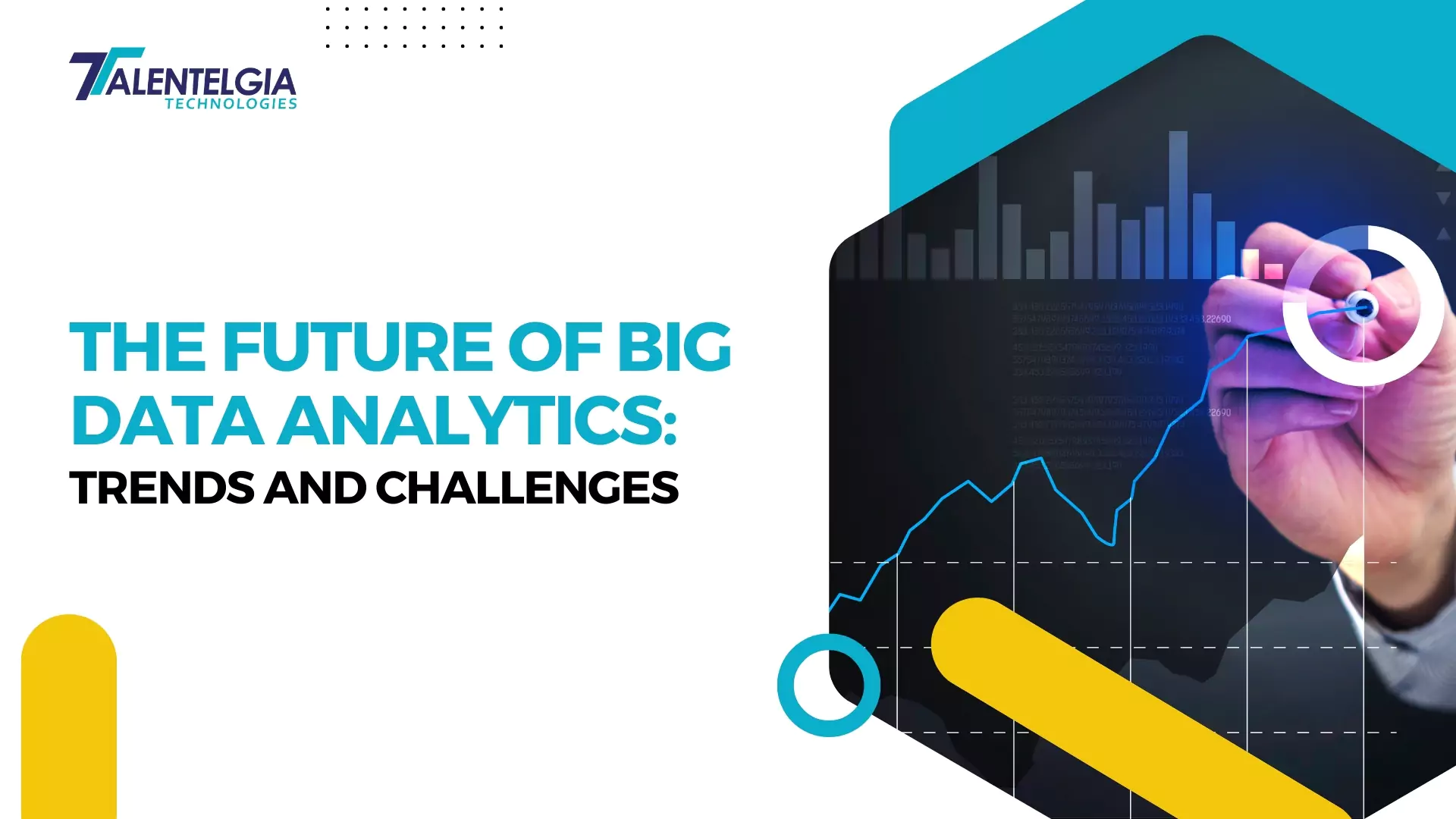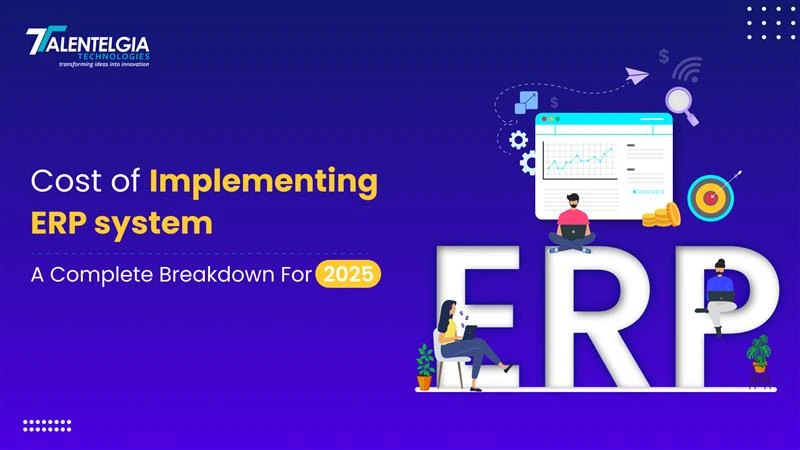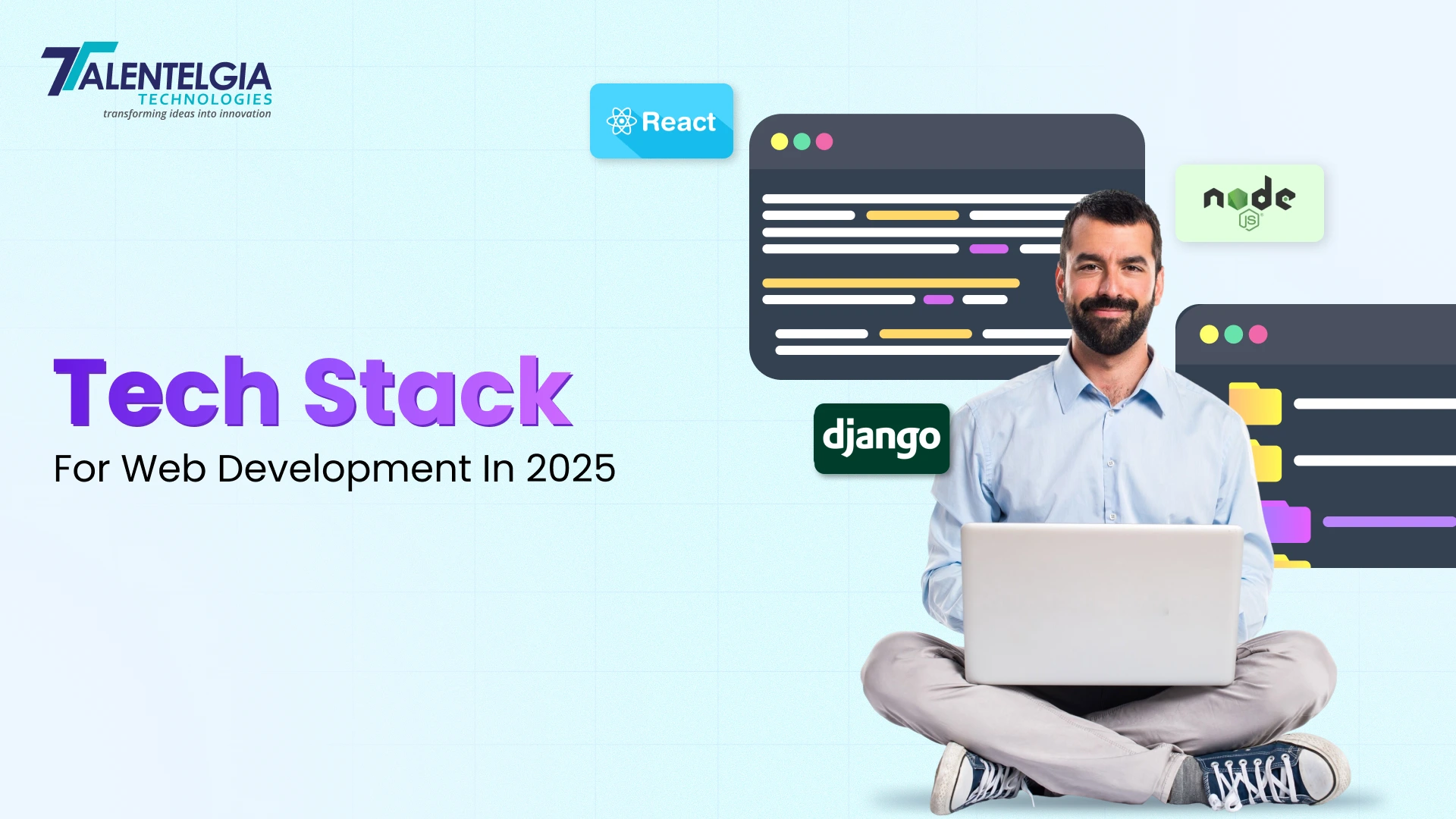The explosion of data across industries has given rise to the era of Big Data. Organizations now have access to vast amounts of information, offering valuable insights and opportunities for growth.
Big Data analytics has emerged as a critical discipline, empowering companies to make data-driven decisions, optimize processes, and gain a competitive edge. As we step into the future, the landscape of Big Data analytics is set to evolve, bringing forth new trends and challenges that demand attention. In this blog post, we explore the key trends to watch and the challenges to address in the future of Big Data analytics.
Trends to Watch
The future of Big Data analytics promises to be exciting yet challenging. As data becomes increasingly central to business success, organizations must stay abreast of the latest trends and tackle the inherent challenges head-on. Embracing real-time analytics, AI and ML integration, edge computing, and NLP will empower businesses to derive actionable insights from their data.
At the same time, addressing data quality, scalability, talent shortages, ethical concerns, and regulatory compliance will pave the way for responsible and sustainable Big Data analytics practices. By capitalizing on these trends and addressing challenges proactively, businesses can unlock the true potential of Big Data and gain a competitive advantage in the digital age.
Real-time Analytics
With the continuous generation of data from diverse sources such as IoT devices, social media, and sensors, the demand for real-time analytics will grow significantly. Businesses will need to process and analyze data in real-time to respond swiftly to emerging trends, customer demands, and potential issues.
AI and Machine Learning Integration
Artificial Intelligence (AI) and Machine Learning (ML) will play a pivotal role in the future of Big Data analytics. AI-powered analytics tools will facilitate faster and more accurate data processing, uncovering patterns, predicting outcomes, and automating decision-making processes.
Edge Computing
As data volumes continue to skyrocket, relying solely on centralized data centers for processing becomes less feasible. Edge computing, which involves processing data closer to the source, will gain prominence, reducing latency and ensuring data privacy and security.
Natural Language Processing (NLP)
The ability to derive insights from unstructured data, such as text and speech, will become crucial. NLP advancements will enable Big Data analytics platforms to understand and analyze human language, leading to enhanced data interpretation and better decision-making.
Data Privacy and Security
As data breaches and cyber-attacks become more sophisticated, data privacy and security will remain a top priority. Businesses will invest in robust security measures and adhere to stringent data protection regulations to ensure the integrity and confidentiality of sensitive information.
Challenges to Address
Big Data analytics has come a long way, and its journey is far from over. As we look ahead to the future, the potential of Big Data analytics to revolutionize industries and empower businesses is evident.
To address the skills gap, organizations can invest in structured upskilling—encouraging analysts and engineers to explore SQL on DataCamp and build practical querying and database design skills. Beginner-to-advanced, hands-on courses help teams write efficient SQL, analyze large datasets, and deliver real-time, business-ready insights.
Data Quality and Integration
The quality and consistency of data continue to be a significant challenge. As data comes from various sources, ensuring its accuracy and integration into a unified format is vital for reliable analysis and decision-making.
Scalability
The exponential growth of data means that Big Data analytics infrastructure must be scalable to handle the increasing volume. Organizations will need to adopt cloud-based solutions and modernize their hardware and software to keep up with the demands of Big Data processing.
Talent Gap
The shortage of skilled data scientists and analysts will persist as the demand for Big Data expertise continues to rise. Organizations must invest in training and upskilling their workforce or consider collaborating with external experts to harness the full potential of their data.
Ethical Concerns
With the abundance of data, ethical considerations surrounding data collection, usage, and potential biases become critical. Organizations must establish clear ethical guidelines and frameworks to ensure responsible data analytics practices.
Regulatory Compliance
Data privacy regulations are evolving and becoming more stringent worldwide. Companies must navigate the complexities of compliance, safeguarding customer data and earning their trust.
How Big Data Analytics Work?
Before diving into the future of Big Data analytics, it’s essential to understand how this powerful technology works. Big Data analytics involves a multi-step process that turns raw data into valuable insights. Let’s explore the key stages of Big Data analytics:
Data Collection
The first step in Big Data analytics is collecting data from various sources, such as social media, IoT devices, sensors, customer interactions, and more. This data can be structured, semi-structured, or unstructured, and it may reside in databases, data lakes, or distributed file systems.
Data Preprocessing
Once collected, the data undergoes preprocessing to clean, transform, and structure it for analysis. This stage involves tasks like removing duplicates, handling missing values, and converting unstructured data into a usable format.
Data Storage
Big Data requires powerful and scalable storage solutions. Companies may employ distributed databases, data warehouses, or cloud-based storage services to handle the vast amounts of information generated.
Data Analysis
At the core of Big Data analytics is data analysis, where various techniques, algorithms, and tools are applied to discover patterns, trends, and relationships within the data. This step involves descriptive, diagnostic, predictive, and prescriptive analytics.
Data Visualization
Once insights are derived, data visualization techniques are used to present the findings in a clear and understandable manner. Visualizations help stakeholders grasp complex patterns quickly and make informed decisions.
Interpretation and Decision-making
The final step involves interpreting the results of the analysis and using them to make data-driven decisions. Businesses can optimize processes, enhance customer experiences, and identify new opportunities based on the insights obtained from Big Data analytics.
Impact of Data Analytics on Different Industries
Big Data analytics has had a transformative impact on various industries, reshaping the way they operate, innovate, and interact with customers. Let’s explore how data analytics has influenced some key sectors:
Healthcare
Big Data analytics has revolutionized healthcare by enabling personalized medicine, early disease detection, and improved patient outcomes. Health providers can leverage patient data to develop precise treatment plans and predict potential health risks.
Retail
In the retail sector, Big Data analytics drives personalized marketing campaigns, demand forecasting, and inventory management. Retailers can analyze customer preferences, buying behavior, and social media interactions to offer tailored products and experiences.
Finance
Financial institutions utilize Big Data analytics to detect fraudulent activities, assess credit risk, and improve customer service. Real-time data analysis allows them to make split-second trading decisions, leading to better investment outcomes.
Manufacturing
Big Data analytics has transformed manufacturing processes through predictive maintenance, quality control, and supply chain optimization. Sensors and IoT devices provide real-time data on equipment performance, helping prevent breakdowns and reduce downtime.
Marketing and Advertising
Data analytics has become the backbone of marketing and advertising strategies. Marketers can analyze consumer behavior, preferences, and engagement patterns to craft targeted campaigns that resonate with the intended audience.
Transportation and Logistics
In the transportation industry, Big Data analytics enhances route optimization, fleet management, and predictive maintenance. Companies can reduce fuel consumption, improve delivery efficiency, and enhance overall logistics operations.
Education
In education, Big Data analytics assists in personalized learning, student performance analysis, and curriculum improvement. Educators can identify at-risk students early on and tailor teaching approaches to individual needs.
Conclusion
By embracing emerging trends like real-time analytics, AI integration, and edge computing, organizations can harness the full power of Big Data and drive innovation. However, the road ahead is not without challenges, and addressing data quality, scalability, talent gaps, ethics, and compliance will be crucial for successful implementation. By navigating these challenges and leveraging the transformative impact of data analytics on various industries, businesses can unlock new opportunities, drive growth, and stay ahead in the dynamic world of data-driven decision-making.


 Healthcare App Development Services
Healthcare App Development Services
 Real Estate Web Development Services
Real Estate Web Development Services
 E-Commerce App Development Services
E-Commerce App Development Services E-Commerce Web Development Services
E-Commerce Web Development Services Blockchain E-commerce Development Company
Blockchain E-commerce Development Company
 Fintech App Development Services
Fintech App Development Services Fintech Web Development
Fintech Web Development Blockchain Fintech Development Company
Blockchain Fintech Development Company
 E-Learning App Development Services
E-Learning App Development Services
 Restaurant App Development Company
Restaurant App Development Company
 Mobile Game Development Company
Mobile Game Development Company
 Travel App Development Company
Travel App Development Company
 Automotive Web Design
Automotive Web Design
 AI Traffic Management System
AI Traffic Management System
 AI Inventory Management Software
AI Inventory Management Software
 AI Software Development
AI Software Development  AI Development Company
AI Development Company  AI App Development Services
AI App Development Services  ChatGPT integration services
ChatGPT integration services  AI Integration Services
AI Integration Services  Generative AI Development Services
Generative AI Development Services  Natural Language Processing Company
Natural Language Processing Company Machine Learning Development
Machine Learning Development  Machine learning consulting services
Machine learning consulting services  Blockchain Development
Blockchain Development  Blockchain Software Development
Blockchain Software Development  Smart Contract Development Company
Smart Contract Development Company  NFT Marketplace Development Services
NFT Marketplace Development Services  Asset Tokenization Company
Asset Tokenization Company DeFi Wallet Development Company
DeFi Wallet Development Company Mobile App Development
Mobile App Development  IOS App Development
IOS App Development  Android App Development
Android App Development  Cross-Platform App Development
Cross-Platform App Development  Augmented Reality (AR) App Development
Augmented Reality (AR) App Development  Virtual Reality (VR) App Development
Virtual Reality (VR) App Development  Web App Development
Web App Development  SaaS App Development
SaaS App Development Flutter
Flutter  React Native
React Native  Swift (IOS)
Swift (IOS)  Kotlin (Android)
Kotlin (Android)  Mean Stack Development
Mean Stack Development  AngularJS Development
AngularJS Development  MongoDB Development
MongoDB Development  Nodejs Development
Nodejs Development  Database Development
Database Development Ruby on Rails Development
Ruby on Rails Development Expressjs Development
Expressjs Development  Full Stack Development
Full Stack Development  Web Development Services
Web Development Services  Laravel Development
Laravel Development  LAMP Development
LAMP Development  Custom PHP Development
Custom PHP Development  .Net Development
.Net Development  User Experience Design Services
User Experience Design Services  User Interface Design Services
User Interface Design Services  Automated Testing
Automated Testing  Manual Testing
Manual Testing  Digital Marketing Services
Digital Marketing Services 
 Ride-Sharing And Taxi Services
Ride-Sharing And Taxi Services Food Delivery Services
Food Delivery Services Grocery Delivery Services
Grocery Delivery Services Transportation And Logistics
Transportation And Logistics Car Wash App
Car Wash App Home Services App
Home Services App ERP Development Services
ERP Development Services CMS Development Services
CMS Development Services LMS Development
LMS Development CRM Development
CRM Development DevOps Development Services
DevOps Development Services AI Business Solutions
AI Business Solutions AI Cloud Solutions
AI Cloud Solutions AI Chatbot Development
AI Chatbot Development API Development
API Development Blockchain Product Development
Blockchain Product Development Cryptocurrency Wallet Development
Cryptocurrency Wallet Development About Talentelgia
About Talentelgia  Our Team
Our Team  Our Culture
Our Culture 
 Healthcare App Development Services
Healthcare App Development Services Real Estate Web Development Services
Real Estate Web Development Services E-Commerce App Development Services
E-Commerce App Development Services E-Commerce Web Development Services
E-Commerce Web Development Services Blockchain E-commerce
Development Company
Blockchain E-commerce
Development Company Fintech App Development Services
Fintech App Development Services Finance Web Development
Finance Web Development Blockchain Fintech
Development Company
Blockchain Fintech
Development Company E-Learning App Development Services
E-Learning App Development Services Restaurant App Development Company
Restaurant App Development Company Mobile Game Development Company
Mobile Game Development Company Travel App Development Company
Travel App Development Company Automotive Web Design
Automotive Web Design AI Traffic Management System
AI Traffic Management System AI Inventory Management Software
AI Inventory Management Software AI Software Development
AI Software Development AI Development Company
AI Development Company ChatGPT integration services
ChatGPT integration services AI Integration Services
AI Integration Services Machine Learning Development
Machine Learning Development Machine learning consulting services
Machine learning consulting services Blockchain Development
Blockchain Development Blockchain Software Development
Blockchain Software Development Smart contract development company
Smart contract development company NFT marketplace development services
NFT marketplace development services IOS App Development
IOS App Development Android App Development
Android App Development Cross-Platform App Development
Cross-Platform App Development Augmented Reality (AR) App
Development
Augmented Reality (AR) App
Development Virtual Reality (VR) App Development
Virtual Reality (VR) App Development Web App Development
Web App Development Flutter
Flutter React
Native
React
Native Swift
(IOS)
Swift
(IOS) Kotlin (Android)
Kotlin (Android) MEAN Stack Development
MEAN Stack Development AngularJS Development
AngularJS Development MongoDB Development
MongoDB Development Nodejs Development
Nodejs Development Database development services
Database development services Ruby on Rails Development services
Ruby on Rails Development services Expressjs Development
Expressjs Development Full Stack Development
Full Stack Development Web Development Services
Web Development Services Laravel Development
Laravel Development LAMP
Development
LAMP
Development Custom PHP Development
Custom PHP Development User Experience Design Services
User Experience Design Services User Interface Design Services
User Interface Design Services Automated Testing
Automated Testing Manual
Testing
Manual
Testing About Talentelgia
About Talentelgia Our Team
Our Team Our Culture
Our Culture


















 Write us on:
Write us on:  Business queries:
Business queries:  HR:
HR: 




